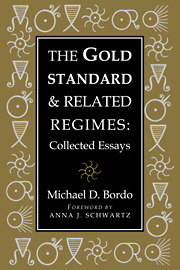Book contents
- Frontmatter
- Contents
- Foreword
- 1 The Gold Standard and Related Regimes: Introduction to the Collection
- Part I History of Doctrine and the Gold Standard
- Part II The Gold Standard as a Commodity Standard
- Part III The Gold Standard as a Contingent Rule
- 7 The Gold Standard as a Commitment Mechanism
- 8 The Operation of the Specie Standard: Evidence for Core and Peripheral Countries, 1880–1990
- 9 The Gold Standard as a “Good Housekeeping Seal of Approval”
- Part IV Historical Case Studies
- Part V The Bretton Woods International Monetary System
- Index
- Titles in the series
9 - The Gold Standard as a “Good Housekeeping Seal of Approval”
Published online by Cambridge University Press: 19 October 2009
- Frontmatter
- Contents
- Foreword
- 1 The Gold Standard and Related Regimes: Introduction to the Collection
- Part I History of Doctrine and the Gold Standard
- Part II The Gold Standard as a Commodity Standard
- Part III The Gold Standard as a Contingent Rule
- 7 The Gold Standard as a Commitment Mechanism
- 8 The Operation of the Specie Standard: Evidence for Core and Peripheral Countries, 1880–1990
- 9 The Gold Standard as a “Good Housekeeping Seal of Approval”
- Part IV Historical Case Studies
- Part V The Bretton Woods International Monetary System
- Index
- Titles in the series
Summary
In this chapter we argue that during the period from 1870 to 1914 adherence to the gold standard was a signal of financial rectitude, a “Good Housekeeping seal of approval,” that facilitated access by peripheral countries to capital from the core countries of western Europe. Examination of data from nine widely different capital-importing countries, using a model inspired by the Capital Asset Pricing Model, reveals that countries with poor records of adherence were charged considerably more than those with good records, enough to explain the determined effort to stay on gold made by a number of capitalimporting countries.
The global economy in its present form emerged in the half century before World War I. That “golden age” was characterized by massive interregional flows of capital, labor, and goods. It was also an era when most nations adhered to (or attempted to adhere to) the gold standard rule of convertibility of national currencies into a fixed weight of gold. Common adherence to gold convertibility in turn linked the world together through fixed exchange rates. In this article we argue that adherence to the gold standard also served as “a Good Housekeeping seal of approval” that facilitated access by peripheral countries to capital vital to their development from the core countries of Western Europe.
We view the gold standard as a contingent rule or a rule with escape clauses. Members were expected to adhere to convertibility except in the event of a well-understood emergency such as a war, a financial crisis, or a shock to the terms of trade.
- Type
- Chapter
- Information
- The Gold Standard and Related RegimesCollected Essays, pp. 318 - 364Publisher: Cambridge University PressPrint publication year: 1999
- 1
- Cited by



